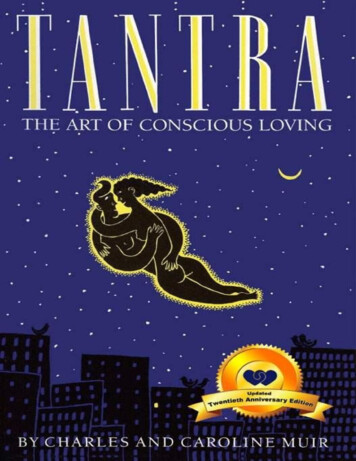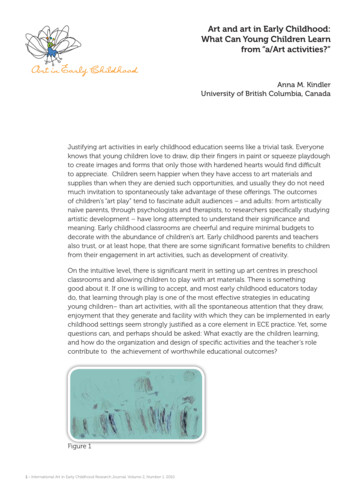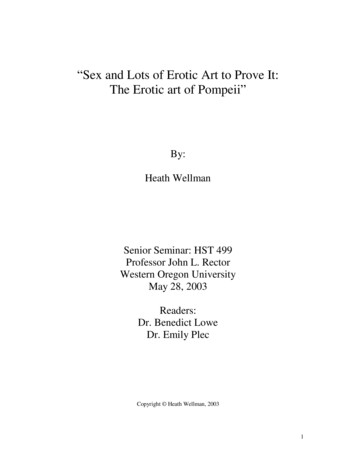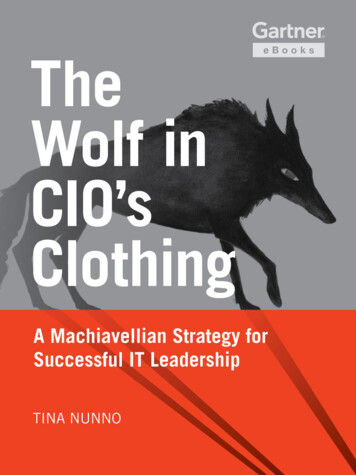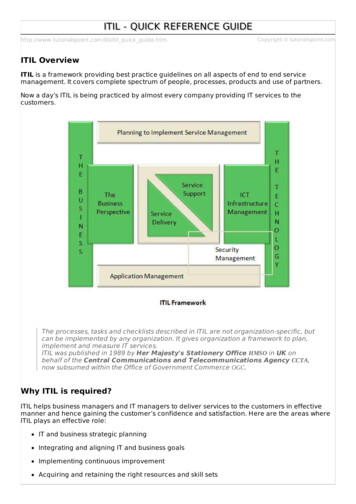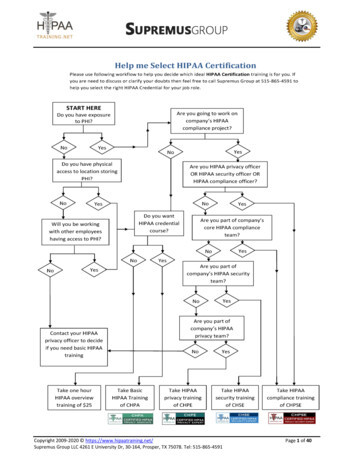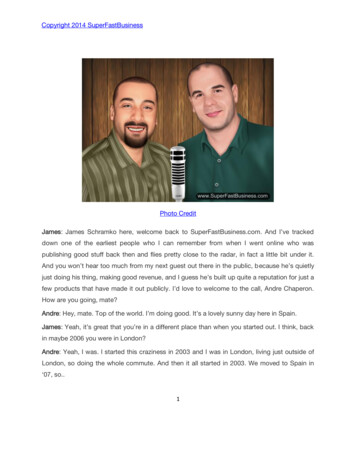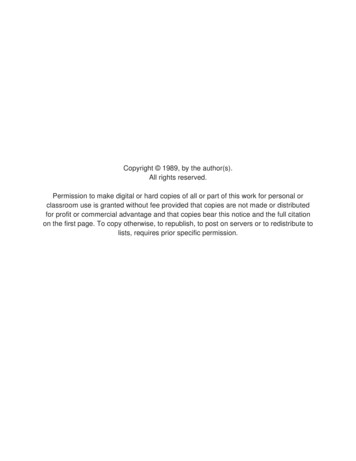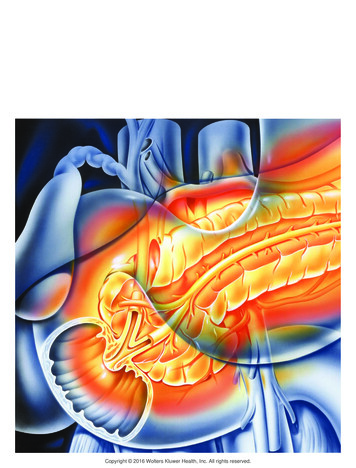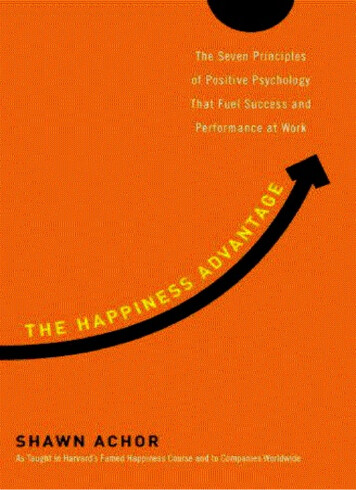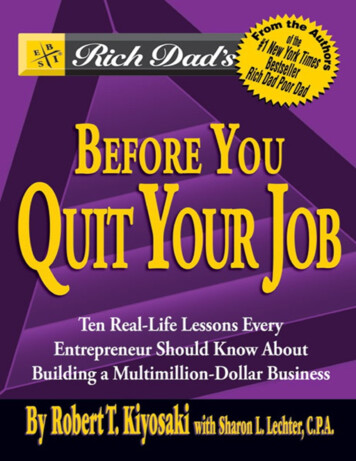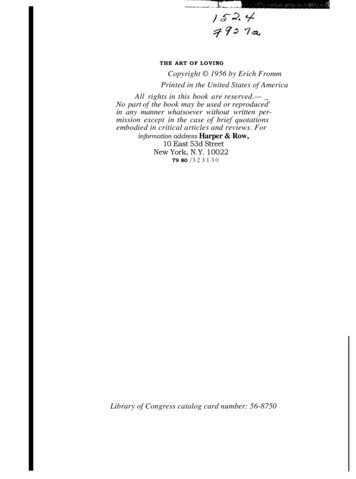
Transcription
THE ART OF LOVINGCopyright 1956 by Erich FrommPrinted in the United States of AmericaAll rights in this book are reserved.—No part of the book may be used or reproduced'in any manner whatsoever without written permission except in the case of brief quotationsembodied in critical articles and reviews. Forinformation address Harper & Row,10 East 53d StreetNew York, N.Y. 1002279 80/3 2 3 1 3 0Library of Congress catalog card number: 56-8750
WORLD PERSPECTIVESFOREWORDI. IsLOVE AN ART?II. THE THEORY OF LOVE1. Love, the Answer to the Problem ofHuman Existence2. Love Between Parent and Child3. The Objects of Lovea. Brotherly Loveb. Motherly Lovec. Erotic Loved. Self-Lovee. Love of God17III. LOVE AND ITS DISINTEGRATION IN CONTEMPORARY WESTERN SOCIETYIV.THE PRACTICE OF LOVE83107
World PerspectivesWORLD PERSPECTIVES is dedicated to the concept ofman born out of a universe perceived through a fresh visionof reality. Its aim is to present short books written by themost conscious and responsible minds of today. Each volumerepresents the thought and belief of each author and setsforth the interrelation of the changing religious, scientific,artistic, political, economic and social influences upon man'stotal experience.This Series is committed to a re-examination of all thosesides of human endeavor which the specialist was taught tobelieve he could safely leave aside. It interprets present andpast events impinging on human life in our growing WorldAge and envisages what man may yet attain when summoned by an unbending inner necessity to the quest of whatis most exalted in him. Its purpose is to offer new vistas interms of world and human development while refusing tobetray the intimate correlation between universality and individuality, dynamics and form, freedom and destiny. Eachauthor treats his subject from the broad perspective of theworld community, not from the Judaeo-Christian, Westernor Eastern viewpoint alone.Certain fundamental questions which have received toolittle consideration in the face of the spiritual, moral andpolitical world crisis of our day, and in the light of technologyix
XWORLD PERSPECTIVESwhich has released the creative energies of peoples, aretreated in these books. Our authors deal with the increasing realization that spirit and nature are not separate andapart; that intuition and reason must regain theirimportance as the means of perceiving and fusing inner beingwith outer reality.World Perspectives endeavors to show that the conceptionof wholeness, unity, organism is a higher and more concreteconception than that of matter and energy. Thus it wouldseem that science itself must ultiMately pursue the aim of interpreting the physical world of matter and energy in termsof the biological conception of organism. An enlarged meaning of life, of biology, not as it is revealed in the test tube ofthe laboratory but as it is experienced within the organismof life itself is attempted in this Series. For the principle oflife consists in the tension which connects spirit with therealm of matter. The element of life is dominant in the verytexture of nature, thus rendering life, biology, a transempirical science. The laws of life have their origin beyond theirmere physical manifestations and compel us to consider theirspiritual source. In fact, the widening of the conceptualframework has not only -served to restore order within therespective branches of knowledge, but has also disclosedanalogies in man's position regarding the analysis and synthesis of experience in apparently separated domains ofknowledge suggesting the possibility of an ever more embracing objective description of the meaning of life.Knowledge, it is shown in these books, no longer consistsin a manipulation of man and nature as opposite forces, norin the reduction of data to mere statistical order, but is a
WORLD PERSPECTIVESXimeans of liberating mankind from the destructive power offear, pointing the way toward the goal of the rehabilitationof the human will and the rebirth of faith and confidence inthe human person. The works published also endeavor toreveal that the cry for patterns, systems and authorities isgrowing less insistent as the desire grows stronger in bothEast and West for the recovery of a dignity, integrity andself-realization which are the inalienable rights of man whomay now guide change by means of conscious purpose in thelight of rational experience.Other vital questions explored relate to problems of international understanding as well as to problems dealing withprejudice and the resultant tensions and antagonisms. Thegrowing perception and responsibility of our World Agepoint to the new reality that the individual person and thecollective person supplement and integrate each other; thatthe thrall of totalitarianism of both right and left has beenshaken in the universal desire to recapture the authority oftruth and of human totality. Mankind can finally place itstrust not in a proletarian authoritarianism, not in a secularized humanism, both of which have betrayed the spiritualproperty right of history, but in a sacramental brotherhoodand in the unity of knowledge. This new consciousness hascreated a widening of human horizons beyond every parochialism, and a revolution in human thought comparable tothe basic assumption, among the ancient Greeks, of thesovereignty of reason; corresponding to the great effulgenceof the moral conscience articulated by the Hebrew prophets;analogous to the fundamental assertions of Christianity; orto the beginning of a new scientific era, the era of the science
XiiWORLD PERSPECTIVESof dynamics, the experimental foundations of which werelaid by Galileo in the Renaissance.An important effort of this. Series is to re-examine thecontradictory meanings and applications which are giventoday to such terms as democracy, freedom, justice, love,peace, brotherhood and God. The purpose of such inquiriesis to clear the way for the foundation of a genuine worldhistory not in terms of nation or race or culture but in termsof man in relation to God, to himself, his fellow man andthe universe that reach beyond immediate self-interest. Forthe meaning of the World Age consists in respecting man'shopes and dreams which lead to a deeper understanding ofthe basic values of all peoples.Today in the East and in the West men are discoveringthat they are bound together, beyond any divisiveness, by amore fundamental unity than any mere agreement in thoughtand doctrine. They are beginning to know that all menpossess the same primordial desires and tendencies; that thedomination of man over man can no longer be justified byany appeal to God or nature; and such consciousness is thefruit of the spiritual and moral revolution, the great seismicupheaval, through which humanity is now passing.World Perspectives is planned to gain insight into themeaning of man, who not only is determined by history butwho also determines history. History is to be understood asconcerned not only with the life of man on this planet butas including also such cosmic influences as interpenetrate ourhuman world.This generation is discovering that history does not conform to the social optimism of modern civilization and that
WORLD PERSPECTIVESXiiithe organization of human communities and the establishment of justice, freedom and peace are not only intellectualachievements but spiritual and moral achievements as well,demanding a cherishing of the wholeness of human personality and constituting a never-ending challenge to man,emerging from the abyss of meaninglessness and suffering, tobe renewed and replenished in the totality of his life. "Foras one's thinking is, such one becomes, and it is because ofthis that thinking should be purified and transformed, forwere it centered upon truth as it is now upon things perceptible to the senses, who would not be liberated from hisbondage." *There is in mankind today a counterforce to the sterilityand danger of a quantitative, anonymous mass culture, anew, if sometimes imperceptible, spiritual sense of convergence toward world unity on the basis of the sacredness ofeach human person and respect for the plurality of cultures.There is a growing awareness that equality and justice arenot to be evaluated in mere numerical terms but that theyare proportionate and analogical in their reality.We stand at the brink of the age of the world in whichhuman life presses forward to actualize new forms. The falseseparation of man and nature, of time and space, of freedom and security, is acknowledged and we are faced with anew vision of man in his organic unity and of history offering a richness and diversity of quality and majesty of scopehitherto unprecedented. In relating the accumulated wisdomof man's spirit to the new reality of the World Age, inarticulating its thought and belief, World Perspectives seeks* Maitri Upanishad 6.34.4. 6.
XiVWORLD PERSPECTIVESto encourage a renaissance of hope in society and of pridein man's decision as to what his destiny will be.The vast extension of knowledge has led to a diminutionof consciousness as a result of the tendency, due to somemodern interpretations of science, to accept as the total truthonly limited descriptions of truth. The triumphant advanceof science, culminating in new realities concerning the subatomic world and overthrowing traditional assumptions ofcausality and uniformity, has almost succeeded in enfeeblingman's faith in his spiritual and moral worth and in his ownsignificance in the cosmic scheme. The experience of dread,into which contemporary man has been plunged through hisfailure to transcend his existential limits, is the experience ofthe problem of whether he shall attain to being through theknowledge of himself or shall not, whether he shall annihilatenothingness or whether nothingness shall annihilate him.For he has been forced back to his origins as a result of theatrophy of meaning, and his anabasis may begin once morethrough his mysterious greatness to re-create his life.The suffering and hope of this century have their originin the interior drama in which the spirit is thrust as a resultof the split within itself, and in the invisible forces which areborn in the heart and mind of man. This suffering and thishope arise also from material problems, economic, political,technological. History itself is not a mere mechanical unfolding of events in the center of which man finds himself as astranger in a foreign land. The specific modern emphasis onhistory as progressive, the specific prophetic emphasis onGod as acting through history, and the specific Christianemphasis on the historical nature of revelation must now
WORLD PERSPECTIVESXVsurrender to the new history embracing the newcosmology—a profound event which is in the process ofbirth in the womb of that invisible universe which is themind and heart of man. For our World Age is indeed themost dire and apocalyptic mankind has ever faced in allhistory, and the endeavor of World Perspectives is to pointto that ultimate moral power at work in the universe, thatvery power upon which all human effort must at last depend.This is the crisis in consciousness made articulate throughthe crisis in science. This is the new awakening after a longhistory which had its genesis in. Descartes' denial that theology could exist as a science, on the one hand, and on theother, in Kant's denial that metaphysics could exist as ascience. Some fossilized forms of such positivistic thinkingstill remain, manifesting themselves in a quasi-sociologicalmythology which, in the guise of scientific concepts, has generated a new animism resulting in a more primitive religionthan the traditional faiths which it endeavors to replace.However, it is now conceded, out of the influences of Whitehead, Bergson and some phenomenologists that in additionto natural science with its tendency to isolate quantitativevalues there exists another category of knowledge whereinphilosophy, utilizing its own instruments, is able to graspthe essence and innermost nature of the Absolute, of reality.The mysterious universe is now revealing to philosophy andto science as well an enlarged meaning of nature and ofman which extends beyond mathematical and experimentalanalysis of sensory phenomena. This meaning rejects the
XViWORLD PERSPECTIVESof mythology adequate only for the satisfaction of emotionalneeds. In other words, the fundamental problems of philosophy, those problems which are central to life, are againconfronting science and philosophy itself. Our problem is todiscover a principle of differentiation and yet relationshiplucid enough to justify and to purify both scientific andphilosophical knowledge by accepting their mutual interdependence.Justice itself which has been "in a state of pilgrimage andcrucifixion" and now is slowly being liberated from the gripof social and political demonologies in the East as well as inthe West, begins to question its own premises. Those modernrevolutionary movements which have challenged the sacredinstitutions of society by protecting social injustice in thename of social justice are also being examined and reevaluated in World Perspectives.When we turn our gaze retrospectively to the early cosmiccondition of man in the third millennium, we observe thatthe concept of justice as something to which man has an inalienable right began slowly to take form and, at the time ofHammurabi in the second millennium, justice as inherentlya part of man's nature and not as a beneficent gift to bebestowed, became part of the consciousness of society. Thisconcept of human rights consisted in the demand for justicein the universe, a demand which exists also in the twentiethcentury through a curious analogy. In accordance with theancient view, man could himself become a god, could assumethe identity of the great cosmic forces in the universe whichsurrounded him. He could influence this universe, not bysupplication,
Our authors deal with the increas-ing realization that spirit and nature are not separate and apart; that intuition and reason must regain their importance as the means of perceiving and fusing inner being with outer reality. World Perspectives endeavors to show that the conception of wholeness, unity, organism is a higher and more concrete conception than that of matter and energy. Thus it .
